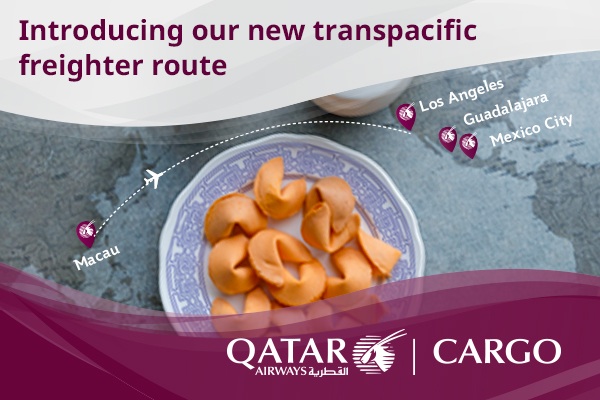|
As predicted last month
by FlyingTypers, there was little sign of a pre-Chinese New Year
rates or volumes surge, with frontloading on the Transpacific lanes
and weak European demand making for a tepid run-in.
The latest numbers from TAC Index reveal
that Hong Kong-North America, lanes dipped from a peak of $5.69 per kg
on November 19, 2018 to 3.52 per kg on January 21 before picking back
up $3.87 per kg on February 4, just as factories in China closed for the
holidays. Hong Kong-Europe routes, meanwhile, peaked at $3.77 per kg on
December 10 before slumping to $2.74 per kg on February 4.
Front Loaded
Better Planning
 Cathy
Morrow Roberson, founder and head analyst at Logistics Trends & Insights,
said the role of tariff deadlines on the Transpacific and the greater
use of technology had limited peak demand spikes for air freight ahead
of Christmas and CNY. Cathy
Morrow Roberson, founder and head analyst at Logistics Trends & Insights,
said the role of tariff deadlines on the Transpacific and the greater
use of technology had limited peak demand spikes for air freight ahead
of Christmas and CNY.
“A lot of this was front-loading and
also improved planning, thanks to tech tools, well ahead of CNY and March
1 tariff deadlines, that's why we saw record-breaking ocean freight imports
late last year versus any significant rise in air volumes,” she
said.
“There was no need for the immediacy
that air provides during the holiday season like in years past, particularly
when inventory levels were already high, due to restocking during the
first half of 2018.
“Better planning is playing a role,
and I believe this is because of the availability of technology tools
that allow for better forecasting and analysis, in such a way that it
helps lower the need for air freight services, which may have been used
in the past.”
A Matter
of Perspective
 The
relative disappointment in the numbers ahead of CNY should be put in perspective,
according to Peter Stallion, air cargo derivatives broker at Freight Investor
Services. Referencing TAC Index numbers, he noted that “growth has
slowed but the rates haven’t retracted as clients had expected.” The
relative disappointment in the numbers ahead of CNY should be put in perspective,
according to Peter Stallion, air cargo derivatives broker at Freight Investor
Services. Referencing TAC Index numbers, he noted that “growth has
slowed but the rates haven’t retracted as clients had expected.”
January 2018, he said, benefitted from the
demand spill over after the exceptional end-of-year peak enjoyed in 2017.
As a result, average rates across weeks 1-5 in January 2018 were 14.6%
higher than a year earlier. However, he noted that in January 2019 average
rates were still 0.21% higher year-on-year.
“If anything, the current rates are
reflective of carrier sentiment rather than driven by immediate demand,”
he explained.
Price Is
Right
“Price levels are maintaining their
inflated rate after a build up over 2017 and 2018.
“However, the price movements over
the January period have not reflected the drop off in demand.”
He said a number of FIS clients had expected
rates to drop to around the levels seen at the start of 2017 and were
querying why supply and demand fundamentals were not being reflected in
pricing.
“Supply is high, and only set to go
higher as carriers either start acquiring greater numbers of wide-body
aircraft or modernize their fleets to take on greater payloads,”
he added.
“With a longer view, a lot of these
airlines will be taking on a risky position [betting] on the [positive]
development of e-commerce and pharmaceutical markets.
“It creates a perfect scenario for
fairly unpredictable medium-term market movements that will react to the
results of macro-economic events throughout the year.”
IATA Cargo
Watch
The structural issues that could become
an issue during 2019 for air cargo sector were laid bare as full-year
2018 data from IATA for global air freight markets showed that demand,
measured in freight ton kilometers, grew by 3.5% compared to 2017 with
international e-commerce a key expansionary driver. This compared to the
“extraordinary” 9.7% year-on-year growth recorded in 2017,”
said IATA. Downward pressure was felt on load factors, as freight capacity
measured in available freight ton kilometers, rose by 5.4% in 2018.
Softening
Demand
 “Air
cargo’s performance in 2018 was sealed by a softening in demand
in December,” said IATA. “Year-on-year, December demand decreased
by 0.5%. This was the worst performance since March 2016. Freight capacity,
however, grew by 3.8%. This was the tenth month in a row that year-on-year
capacity growth outstripped demand growth.” “Air
cargo’s performance in 2018 was sealed by a softening in demand
in December,” said IATA. “Year-on-year, December demand decreased
by 0.5%. This was the worst performance since March 2016. Freight capacity,
however, grew by 3.8%. This was the tenth month in a row that year-on-year
capacity growth outstripped demand growth.”
Alexandre de Juniac, IATA’s Director
General and CEO, said “air cargo demand lost momentum towards the
end of 2018 in the face of weakening global trade, sagging consumer confidence
and geopolitical headwinds.”
Still Optimism
“We are cautiously optimistic that
demand will grow in the region of 3.7% in 2019,” he said. “But
with the persistence of trade tensions and protectionist actions by some
governments, there is significant downside risk. Keeping borders open
to people and to trade is critical.”
Looks For
Later Surge
Roberson does not expect demand to really
start surging until later this year. “For this quarter, I expect
a slight uptick in air freight volumes as compared to December and November
but nothing significant,” she told FlyingTypers. “Air
freight volumes will probably not pick up until inventory levels are drawn
down, perhaps by mid-2019.”
Chuck The
View
 Charles
‘Chuck’ Clowdis, Jr., managing director of logistics consultancy
Trans-Logistics Group, believes air market forecasting now is as difficult
as at any time in recent history, particularly on Transpacific trade lanes. Charles
‘Chuck’ Clowdis, Jr., managing director of logistics consultancy
Trans-Logistics Group, believes air market forecasting now is as difficult
as at any time in recent history, particularly on Transpacific trade lanes.
“Trade talk uncertainty has impacted
air freight volumes, and possibly rate-levels, twice at least, in the
past year,” he explained.
“First, last year in anticipation
of ‘something’ resulting from U.S.-China sword rattling, large
tariff increases loomed which caused an inventory build-up as U.S. consumers
continued to feed their growing confidence. This left inventories prematurely
large.
“Then, secondly, as talks sputtered,
trepidation grew that the holiday season might suffer. It did not, yet
November air volumes on Asia/U.S routes slumped. Inventory build had already
occurred.
“Now here we are early in 2019. U.S.-China
talks are still stuck and the murmurings of an administration official
can add concern that again impacts these routes and world markets to some
extent.
Volatile Fragile Uncertain
“In my opinion, based on fifty years
of opining, we are in the most volatile, fragile, and yes, uncertain,
time for forecasting the short or long term, ever experienced.
“The CNY still occurs as it has forever,
but this year there is at least one larger beast in the room and that’s
a resolution to trade disputes between two major players, especially in
the air cargo world.
“As certainty returns, better predictably
should also,” Chuck said.
SkyKing
|






 A
landmark agreement between Turkish Airlines Cargo and Opticooler container
provider DoKaSch of Germany cools the way for expanding perishable shipments
worldwide.
A
landmark agreement between Turkish Airlines Cargo and Opticooler container
provider DoKaSch of Germany cools the way for expanding perishable shipments
worldwide.

 Vol.
18 No. 12
Vol.
18 No. 12